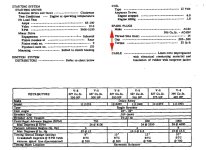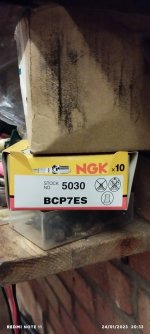Mr. Cricket
Committee Member
Thanks Team. That's pretty much what I found on line this morning and clearly being a '65 it doesn't have any electronics to worry about and I doubt I'll ever use the radio or if it even works. In the conversation with Pertronix he was adamant that with the flame thrower 2 installed in the car it should have the non resister plugs and he sold me a set of HT leads as well to be sure as I couldn't answer what type are on there already.IF the spark plug model # has an R in it, then it has a resister
Also keep in mind sparkplug wires can come with also an RFI reducer, so not mix R with each other
At the moment the spark jumps the gap, it causes a high frequency burst of energy, known as RFI (radio frequency interference). RFI, as its name suggests, creates static on your radio and interference with other electronic equipment, including the vehicle’s on-board electronic control units (ECUs) and be heard with radio output
The resistors are there to smooth out the “arc” that a spark plug makes as it fires.
Resistor plugs were developed in the 1960s to suppress some of the spark energy, thus lowering RFI to an acceptable level.
Most resistor spark plugs use a monolithic resistor, generally made of graphite and glass materials, to filter the electrical voltage as it passes through the center electrode.
Since resistor type plugs actually “resist” some of the spark energy, non-resistor type plugs actually deliver a more powerful spark.
It is for this reason that most racing plugs are non-resistor types.
However, in most automotive applications, a resistor plug is required for proper vehicle operation.
Use of non-resistor plugs in vehicles that call for a resistor type can result in rough idling, high-rpm misfire, and abnormal combustion.
Typically, the resistor in the center electrode of a resistor spark plug will be around 4000 to 6000 ohms.
To check the spark plug resistance, you can use a multimeter and measure the ohm reading by placing the leads on the terminal and the tip.
So in short if the car has limited electronics and want the highest spark then do not use R type plug or wires
If the RFI affects older car radios then use R rated plugs or plug wires but not both at the same time




